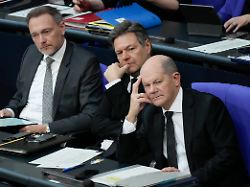NATO goal after 2027
Traffic light is struggling for future Bundeswehr funding
February 24, 2024, 11:01 a.m
Listen to article
This audio version was artificially generated. More info | Send feedback
For the first time, Germany is meeting NATO’s two percent target for defense spending. The reason for this is the special assets. But that expires in 2027. After that, Chancellor Scholz wants to finance the Bundeswehr entirely from the budget. This sparked a heated debate within the coalition.
After Olaf Scholz announced his plan to finance the Bundeswehr solely from the general budget from 2028, the coalition debated whether and how this would be possible. The FDP is calling for social spending to at least be frozen. The SPD chairwoman Saskia Esken and the Green party leaders Katharina DrÃge and Britta HaÃßelmann see this as an attack on the social systems and strictly reject the demand. In contrast to Scholz, Esken supports the idea of taxing the rich more highly.
SPD – Wealth taxation should finance the Bundeswehr
“The Social Democrats are not prepared to cut the social security of families with children, trainees and students or pensioners in order to finance the necessary spending on security and defense,” said Esken. But: “Germany is a rich country in which many very rich people live who can make a greater contribution to the common good and are sometimes willing to do so.”
Green – special assets for long-term investments
The Green parliamentary group leader Haßelmann was rather skeptical about Scholz’s positioning. “We will not achieve the large sums that are necessary (for defense) through savings quotas for each department,” she said. “It shouldn’t mean: armament or pension.” The co-leader of the parliamentary group, Katharina Dröge, argued similarly. Haßelmann therefore referred to other financing options: “In addition to the discussion about reforming the debt brake, we also have to look for other options when it comes to special funds or investment companies in order to enable long-term investments.”
FDP – No further social benefits
FDP chief budget officer Otto Fricke insisted on savings. “We have to stop always talking about priorities. We can only stabilize the budget if we also identify subordinate areas. But that requires more political courage,” said Fricke. “Social benefits represent by far the largest block of expenditure in the federal budget; in 2024 it will be around 46 percent of total expenditure,” he explained. “It is important that their share does not increase any further and that there are no new benefits in order to have enough scope for the urgently needed economic turnaround.” Both are necessary: for Germany to continue to achieve NATO’s two percent quota for defense spending and at the same time to provide new impetus for more economic growth.
Scholz: The Bundeswehr should also be able to defend itself after 2027
After Russia’s attack on Ukraine in 2022, the federal government set up a special fund of 100 billion euros to make the inadequately equipped Bundeswehr capable of defending itself. This year, for the first time in decades, Germany can fulfill its NATO obligation to invest two percent of economic output in defense. “And it will stay that way in the coming years and decades,” promised the Chancellor in a published video message.
However, the special fund expires in 2027. A week ago, Scholz told the “Süddeutsche”: “From 2028 onwards, we want to use the general budget to cover what is necessary to achieve the two percent target. That’s not easy, but we can do it cope.”
